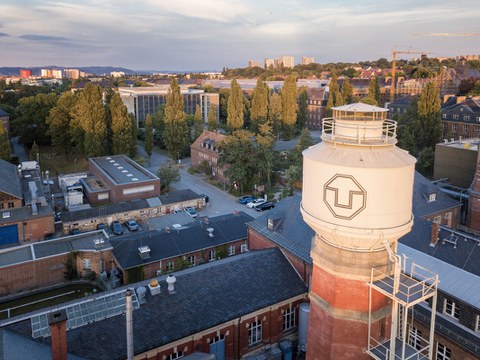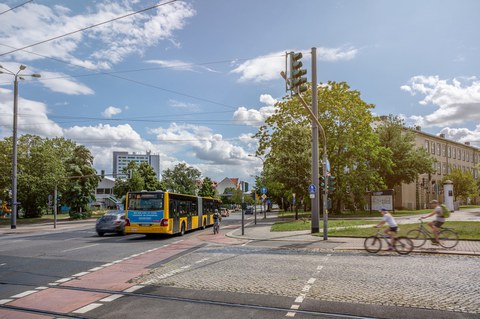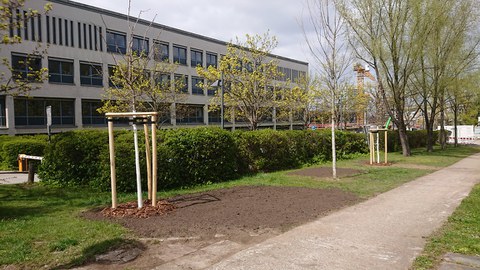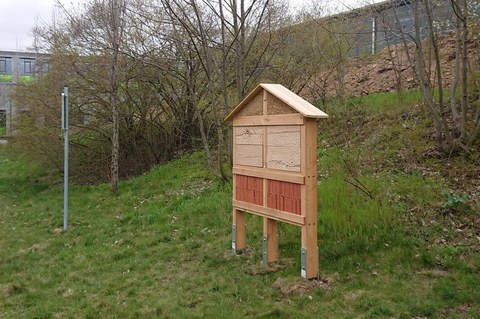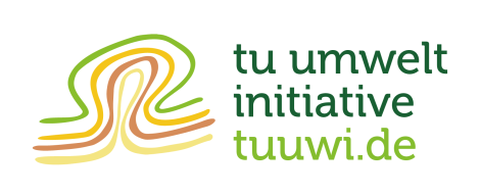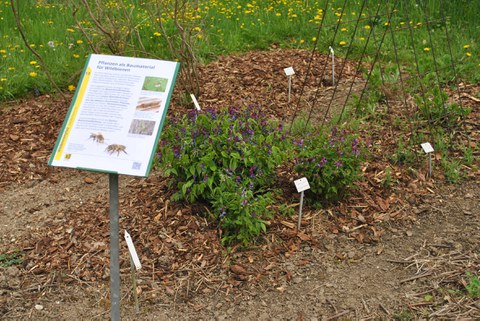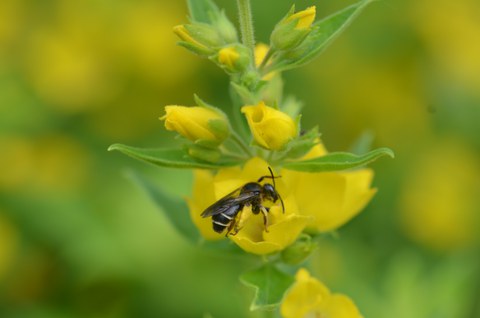Newsletter Occupational Safety, Environmental and Health Protection 01/2021
Table of contents
Environmental Management and Sustainable Campus
Review of the environmental management system of TU Dresden successful - preliminary environmental report published
On April 23, 2021, the environmental audit of TU Dresden for 2020 was successfully completed with the outstanding on-site inspections, so that the EMAS declaration of validity can now be issued by the environmental auditors. Due to the special situation because of the Corona pandemic, the first part of the audit on 30.11. and 1.12.2020 could only take place as a video conference. All appointments, e.g. with the persons responsible for the environmental management system in Department 4, the Prorectorate for University Culture, the student TU environmental initiative or the management of the Botanical Garden, took place virtually. With the two on-site appointments in the road construction laboratory "Claus-Köpcke" and in the Botanical Garden of the TU Dresden, the previously missing conditions for a successful audit were fulfilled. The auditors acknowledged the activities for the continuous improvement of the environmental performance and could not find any deviations according to EMAS. The validity statement of the auditors is currently being prepared.
The preliminary environmental report for this year with the key figures - but currently without the validation statement from the verifiers - is published on the Environmental Reporting website (in German).
Label for sustainable organization of events at TU Dresden
Since January 2021, the TU Dresden participates in the initiative "Little Book of Green Nudges" of the United Nations Environment Programme (UNEP). One project within this framework is the establishment of a label for the organization of sustainable events at TU Dresden. The focus is on the planning and implementation of events from an ecological as well as a social point of view. Organizers of events at the TU Dresden should be given the opportunity to label their event with a corresponding "Sustainable Event" label. The basis will be a checklist with certain measures that have to be implemented (mandatory criteria) in order to receive the label. In addition, the checklist contains further optional criteria. The checklist is supplemented by a guideline with further information, as well as training and consulting opportunities. The basic criteria catalog is discussed and developed together with other universities. A wide range of experience is already available here. . Each university will then adapt this basic criteria catalog to its needs.
Mobility portal now online
Besides practical information about mobility at the TU Dresden, the pages of the mobility portal provide information about climate-friendly forms at the TU Dresden and beyond. Evaluations of the mobility behavior of university members are also presented, which were collected as part of the projects CAMPER MOVE, HochN and the Mobility Concept for the main campus of the TU Dresden. Link to the mobility portal
Paper consumption declines in 2020, recycled paper quota continues to rise
The TU Dresden has been able to further improve in terms of paper consumption and recycled paper share in 2020. The recycled paper share has increased from around 30% to more than 55% in 2020. During the same period, the amount of paper consumed continued to decrease. In 2020, the total consumption of A3 and A4 paper (also Corona-related) - decreased by about 28% (previous year -10%). As in the previous year, TU Dresden is participating in the Papieratlas (Paper Atlas) for Universities, which is organized by the Initiative pro Recyclingpapier and which is supported by the Bundesumweltministerium (Federal Ministry for the Environment), Umweltbundesamt (Federal Environment Agency) and Deutschen Hochschulverband (German Association of Universities). Participation in the paper atlas is intended to motivate universities to save paper and use more recycled paper in order to conserve resources.
Further Information: "Initiative Pro Recycling Papier" and "Papieratlas"
More biodiversity - tree planting and insect hotels promote biodiversity on campus
Trees represent important habitats and are of great importance for biodiversity in urban areas. In recent years, the species-rich tree population on campus has declined due to numerous construction and security measures. It is therefore very good news that with the beginning of spring a total of 16 new plantings could be realized in 7 properties. Among them are also numerous sponsored trees. In cooperation with the TU Dresden Stiftung (TU Dresden Foundation) and the Staatsbetrieb Sächsisches Immobilien- und Baumanagement, this campaign has been implemented since 2018. With their commitment, the tree sponsors support the development of a livable and ecologically sustainable campus. For this, the Environmental Protection Group and the TU Dresden Foundation would like to express their sincere thanks to all sponsors. Anyone interested in becoming a sponsor is welcome to contact the TU Dresden Foundation ().
Besides trees, butterfly meadows are of great importance for the biodiversity on campus. Due to a special mowing regime, they represent an important refuge for numerous insect species and, in contrast to a conventional lawn, offer a high diversity of species. This valuable habitat was further enhanced at two locations - at the Judeich Bau in Tharandt and behind the Andreas Pfitzmann Bau - with the installation of insect hotels by the Staatsbetrieb Sächsisches Immobilien- und Baumanagement. Insect hotels provide important nesting and breeding habitats, so they can make a valuable contribution to species conservation and the preservation of biodiversity.
ÖkoNa - Team for ecological sustainability
The extended rectorate has started the campaign "Climate Change is real. Everyone needs to act. TU Dresden starts now!". With the Team ÖkoNa (team for ecological sustainability), a strategic force and a communication structure for the diverse actors in the field of environmental and climate protection at the TU Dresden has been established in the beginning of 2021. To stress the importance of aspects of ecological sustainability an own section of the newsletter will deal with this topic in the future.
The Rectorate also strengthened the role of the Kommission Umwelt (Commission for the Environment) to become a strategic driver for environmental and climate protection issues at TUD. Moreover, a Green Office is currently being set up in the Department of University Culture as a central point of contact.
Team ÖkoNa is planned as an exchange platform which should make visible the environmental commitment of the TU Dresden as well as existing and new initiatives and projects. The resulting synergies will be used to anchor ecological sustainability institutionally and participatively at the TU Dresden.
Projects and Student Activities
Days for environmental sustainablity
A Green Office will soon be established at the TU Dresden. This is a kind of sustainability office, which will serve as a contact point for all members of the university society with concerns about ecological sustainability. Commitment in the field of ecological sustainability will be made visible and supported through transfer and press work. The office will also be there to network actors in the field, promote cooperation and thus strengthen synergy forces.
In order to make the soon-to-be-established Green Office known, the Days for Ecological Sustainability will take place from May 29 to June 5, during which some elements of the Green Office will already be presented. Various activities are planned, such as an environmental film evening, a campus tour and a networking meeting of actors in the field of ecological sustainability. Within an interactive installation, committed people will also have the opportunity to present themselves and their projects. Right next to it there is space for new ideas, wishes and suggestions. Due to the current situation, all events of the Days for Ecological Sustainability are limited to a limited number of participants and can only be attended with registration (https://t1p.de/nachhaltigeTage).
Environmental Ring Lectures of the TU Environmental Initiative (tuuwi) - Summer Semester 2021
All students, employees and guests are invited to the Environmental Ring Lectures. Individual events of the lecture series can also be attended. In the summer semester 2021, two lecture series will take place exclusively as online events (in German):
Rohstoffwende statt Rohstoffwahnsinn – Zeit für eine menschenwürdige und ressourcenschonende Zukunft
Bildung neu denken – Wege in eine zeitgemäße Umweltbildung
The lecture series have already started, but some lectures can also be viewed later. Up-to-date information on these and other events of the tuuwi can be found at the website of the TU Environmental Initiative tuuwi.
BarCamp and affiliated podcast recording of the Soziopod
As part of the lecture series Bildung neu denken – Wege in eine zeitgemäße Umweltbildung (Rethink education – ways to modern education for a sustainable development), the tuuwi (students environmental initiative) and the SLUB organize a BarCamp about education for a sustainable development on the 05.06.2021. A BarCamp is an event where you are at the same time participant and organizer, so you could also offer a session about green campus or another topic you interested in yourself. But you could also be inspired by the sessions of others. The highlight of the evening will be a live podcast recording of the Soziopod. We’ll be happy to see you. More information and link for registration
Occupational Safety and Health Management
Animal by-products - what needs to be considered?
Animal by-products (ABP) are whole animal carcasses, parts of animals or products of animal origin or derived from other animals that are not intended for human consumption, including ova, embryos and semen (Art. 3 No. 1 Regulation (EC) No. 1069/2009). Many ABPs have already found their way into laboratories. For example, blood and blood products such as fetal calf serum, antibodies, and tissue samples or cell cultures from animals also fall under the APB designation. In order to ensure the import permit of ABP and their derived products, in the future it will be necessary to register the respective structural units working with ABP with the Veterinary and Food Surveillance Office.
For the registration process and for further questions, the representative for animal by-products, Mr. Johannes Kautz (), is available at the TU Dresden. A list about already registered structural units as well as further information can be found in RS D4/3/2018 and under the heading TNP of Occupational Safety.
News in brief
New information boards in the Botanical Garden
The Botanical Garden of the TU Dresden is still closed to the public. However, the staff has been preparing everything for the reopening for several weeks. Among others, visitors can look forward to a revised information system. In cooperation with the project "Barrierefreies Leit- und Orientierungssystem" (Accessible Guidance and Orientation System) about 150 plant portraits, which are distributed in the garden as information boards, received a fresh new look.
New texts have also been created, for example, on the subject of wild bees: More than 100 different wild bees - and thus about 25 percent of all Saxon species - live in the garden grounds. 14 information boards, which were created in cooperation with the wild bee representative of the beekeepers' association „Imkerverein Dresden e.V.“, provide insights into the life of this diverse group of insects and give tips for more wild bee diversity in one's own garden. With the reopening of the Botanical Garden, they will become part of an educational bee trail through Dresden, which is being designed by the beekeepers' association and the working group "Biene sucht Blüte" ("Bee seeks flower").
https://www.imkerverein-dresden.de/lehrpfad/
Video series from the Botanical Garden starts in May
Filming is currently underway in the Botanical Garden of the TU Dresden. In the end of May, the first video from the plant collection will appear on the TU's YouTube channel. From then on, employees of the garden will regularly provide insights into the world of botany every two months.
The first video will focus on flower ecology: Which flowers attract which pollinators and can I use this knowledge to promote insect diversity in my own garden or on the balcony? This is followed by videos on bionics, wild bees and the Victoria giant water lily, among others. Some of the videos will be supplemented by social media activities on Instagram and Facebook. So it's worth checking out the Botanic Garden's pages every now and then.
www.tu-dresden.de/bg
Instagram: https://www.instagram.com/botanischer_garten_dresden/
Facebook: https://www.facebook.com/BotanischerGartenderTUDresden
Battery-free Contact Tracing: Fighting the COVID-19 Pandemic with Sustainable Electronics Systems
Researchers from the Networked Embedded Systems Lab of the Center for Advancing Electronics Dresden (cfaed) at TU Dresden have developed a battery-free electronic device that can be used to automatically identify contacts of a contagious person, without needing to be manually recharged.
More details on the faculty website
CO2 compensation possible for DFG funded business trips
In the future, compensation payments will be possible for all CO2 emissions caused by business travel in DFG funding projects as well as by DFG employees, committee members and reviewers. The basis for this is a resolution passed by the Joint Science Conference of the Federal Government and the Länder (GWK), which thus approved a joint initiative by the Alliance of Science Organisations in Germany under the leadership of the DFG.
Further Information: DFG press release (in German) and DFG leaflet (in German)
Opportunity for reusable packaging also in canteens and cafeterias
From 2023 onwards, restaurants, cafés, snack bars etc. that offer takeaway food or drinks are obliged to offer reusable cups and reusable packaging as well. The reusable alternative must not be more expensive than the product in disposable packaging. Moreover, the reusable packaging has to be taken back by the respective restaurant or café. Small stores that have no more than five employees are exempt from the regulation. However, there you can bring your own containers to pick up food. A detailed press release on the amendment to the Packaging Act can be found at https://www.bmu.de/pressemitteilung/mehrweg-wird-moeglich-im-to-go-bereich/.
Natura 2000 - what Saxony has to offer
Natura 2000 is the name of an EU-wide network of protected areas for rare and endangered animal and plant species and their habitats. The crested newt as a charismatic pond dweller and the mountain meadows with their abundance of flowers are just two examples of the wide range of protected species or locations whose continued existence Natura 2000 areas have been established. In many places in Saxony you can experience Natura 2000. The pocket planner "Naturwunder - Natura 2000 in Sachsen - Entdecken, Erleben, Bewahren" (Natural Wonders - Natura 2000 in Sachsen - Discover, Experience, Preserve) vividly illustrates the variety of places and species in Saxony: https://publikationen.sachsen.de/bdb/artikel/36810/documents/57742
Dresden revises its energy and climate protection concept
The state capital of Dresden is updating its Integrierte Energie- und Klimaschutzkonzept (IEK) (integrated energy and climate protection concept) (IEK). The city council has set climate neutrality as a goal well before 2050. Now the city of Dresden is launching a participation process. Together with Dresden companies, initiatives, experts from science, politics, administration, business and citizens, the necessary measures are to be discussed and defined. More information can be found on the website of the state capital Dresden at https://www.dresden.de/de/rathaus/aktuelles/pressemitteilungen/2021/04/pm_066.php.
13th Umundu-Festival planned for autumn
Climate change will be the central topic of the 13th Umundu Festival for sustainable development which takes place from 24 September to 2 October 2021. From Sept. 24 to 26 a festival symposium at the Dresden Technical Collections will take a developmental look at the global phenomenon of climate change. From different perspectives, the program contributions explore why and how our way of life influences the global climate and how societies deal with the challenges of climate change in the 21st century. The festival week aims to show what Dresden's sustainability scene is up to with numerous contributions from local initiatives focusing on the topic. In workshops, discussion rounds, lectures or excursions, everyone can participate in current debates, get to know examples of sustainable (everyday) practice in Dresden, make contacts and become active. In addition, there will be an exciting film program in various cinemas in Dresden. Anyone who has an additional program idea for the festival week is cordially invited to help shape this year's festival program with a contribution. Sketches of ideas can be submitted until 31 May 2021. For more information, please visit the organizers' website: https://umundu.de/festival2021#symposium

